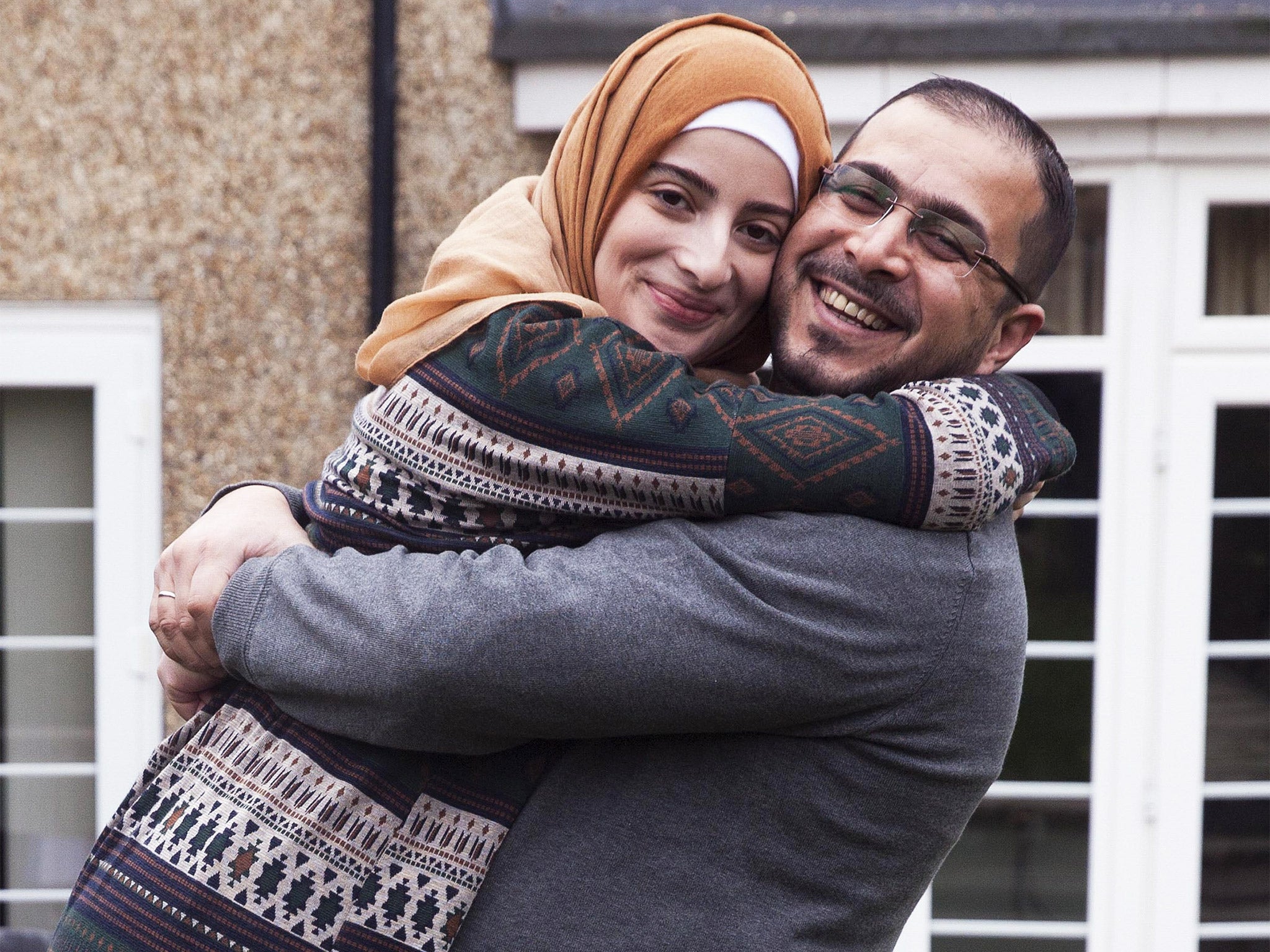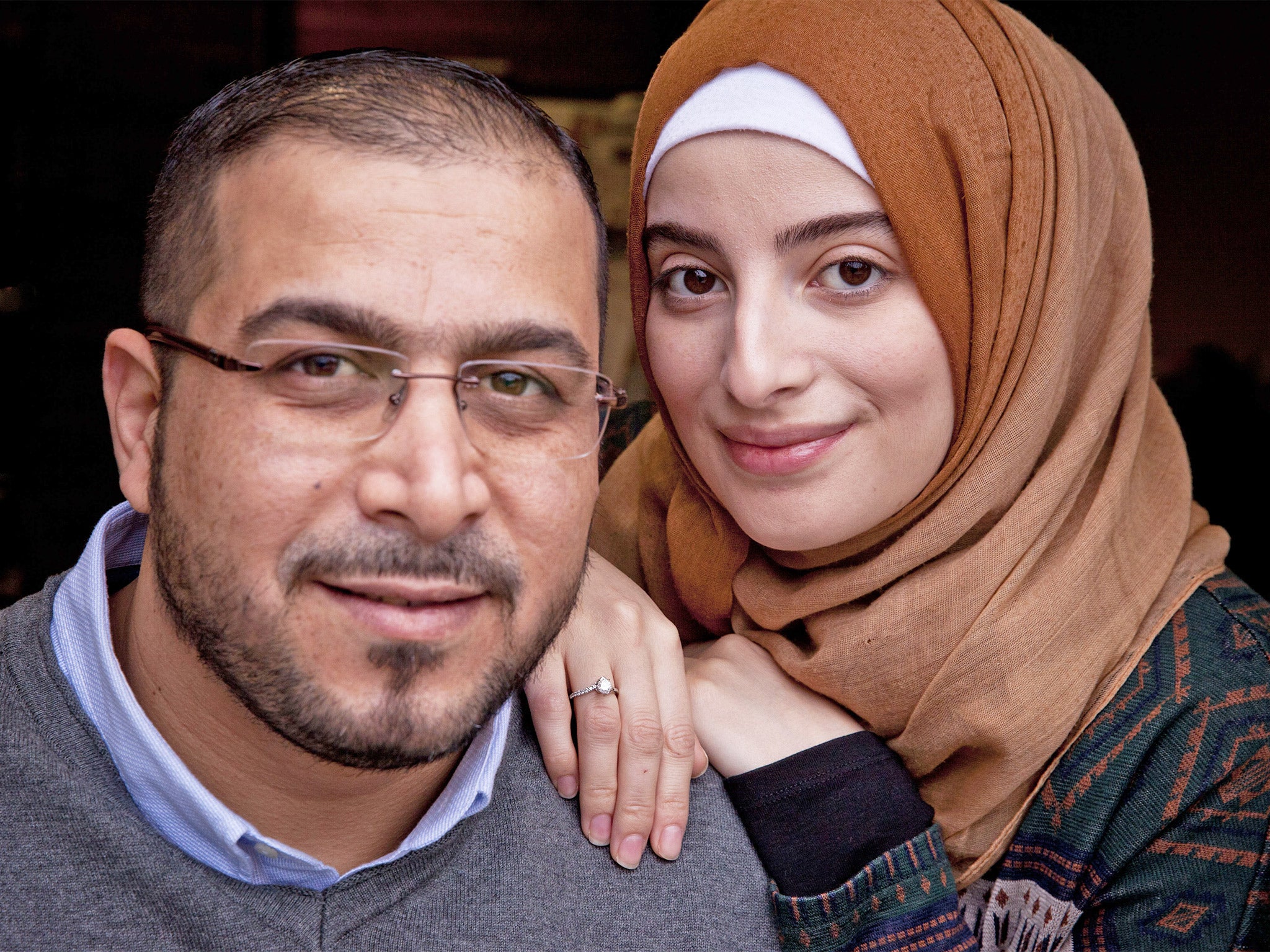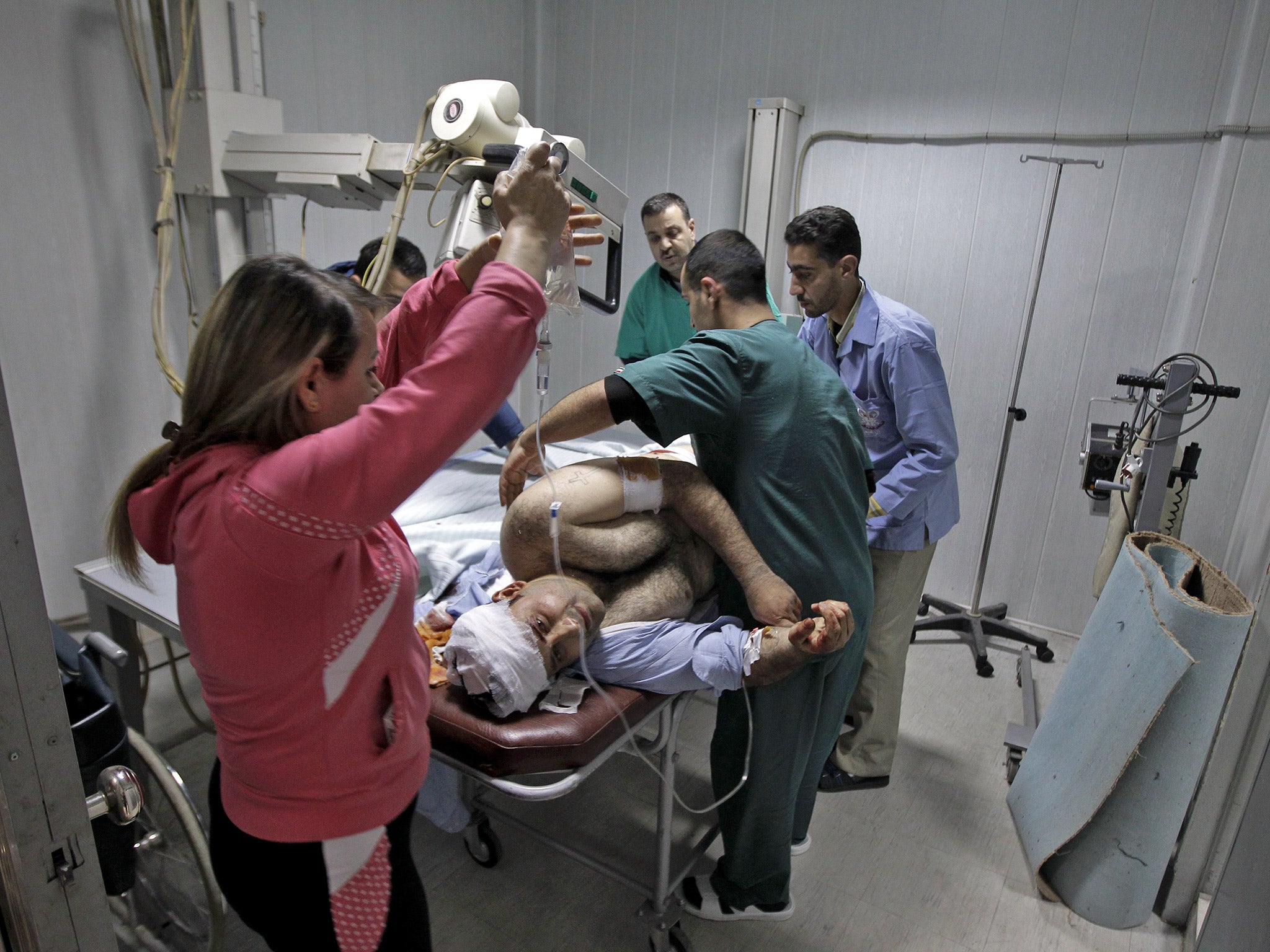A modern-day Syrian love story: Doctor Ahmad Alhameed escaped torture in Homs to join his fiancée in London
British student Razan was unimpressed when she first met Ahmad, a doctor from Syria. But in time, their shared passion for medicine and fears over the civil war brought them together. Then Ahmad was captured in Homs and tortured. Laura Pitel hears how they overcame the odds to be reunited

Your support helps us to tell the story
From reproductive rights to climate change to Big Tech, The Independent is on the ground when the story is developing. Whether it's investigating the financials of Elon Musk's pro-Trump PAC or producing our latest documentary, 'The A Word', which shines a light on the American women fighting for reproductive rights, we know how important it is to parse out the facts from the messaging.
At such a critical moment in US history, we need reporters on the ground. Your donation allows us to keep sending journalists to speak to both sides of the story.
The Independent is trusted by Americans across the entire political spectrum. And unlike many other quality news outlets, we choose not to lock Americans out of our reporting and analysis with paywalls. We believe quality journalism should be available to everyone, paid for by those who can afford it.
Your support makes all the difference.On New Year's Day, shortly before lunchtime, a beaming man emerged from the sliding doors at Heathrow Terminal 3 and made a beeline for a young woman in a cherry-red hijab. As her family cooed and shrieked, he squeezed her tight, lifting her clean off the ground before putting her down and planting a kiss on the top of her head. No onlooker could possibly have guessed how painful their separation had been, or how many times that moment had almost been thwarted. The girl offered a glimpse of their journey when she tweeted a photograph of their reunion that quickly went viral. The caption read: "He proposed Dec 2012. Since: besieged, detained, tortured, made refugee for 1.5 years. Today: reunited in UK." Yet that dramatic summary tells only half the story.
Although theirs is, in part, a classic tale about the triumph of love over adversity, it is sadly not that simple. It is also about a steely young Londoner who poured herself into mending a man left utterly broken by torture. It is about the devastating impact of the Syrian conflict on millions of people and the guilt of those who manage to escape it.
The story begins in 2009, when Syria was just another Arab dictatorship muddling along largely unnoticed by the rest of the world. Razan Alakraa – who is also known as Rose Alhomsi – now 25, was a pharmacy student from Willesden, in north London. Ahmad Alhameed, now 37, was studying for a medical degree at university in Damascus.
Although Razan was born and raised in London, she comes from a large Syrian family. Her parents arrived in Britain in the 1980s but kept in close touch with friends and relatives in Homs, Syria's third-largest city. That circle included Ahmad's family.
They saw each other in the summer of 2009, when her family went on their annual summer holiday to Homs. Warm and intelligent, with radiant skin and dark, almond-shaped eyes, it is little surprise that Razan caught Ahmad's attention. He asked her family if she would marry him. She was utterly uninterested.
Recounting her story over Viber – a mobile app popular with young Syrian activists thanks to its free international phone calls – she chuckles at the memory of her response. "I said: 'No way!' I wanted to study," she recalls. "I completely turned it down." They had no more contact for several years.
When the protests that swept across North Africa ignited Syria in March 2011, they both found themselves sucked into the vortex of events in Homs. In the early weeks, vast gatherings took over the city's central square. They quickly turned to armed resistance after the army of the President, Bashar al-Assad, opened fire on the demonstrations. As fighting intensified, elegant boulevards once lined with trees were reduced to piles of rubble.
By 2012, Razan was spending hours online providing long-distance help to opposition activists in Homs. In her bedroom in Willesden, she would stay up late translating video footage captured by citizen journalists from Arabic to English. She would update social-media accounts and interview doctors in an underground field hospital.
What she hadn't realised was that Ahmad was among the team in that hospital. Sometimes, he would be in the same room as those she was speaking to, working away quietly in the background. He never showed up on the videos or pictures she saw from the clinic.
She got in touch with him for the first time in years in 2012 after hearing that his father and sister had been killed. She sent a message to say how sorry she was. He replied to say that he had seen all her work.
They kept in touch, exchanging messages about the escalating conflict and the ups and downs of daily life. In December 2012, he proposed to her again. "It was a bit of a shock," she admits, even the second time round. In Syria, it is common for couples to agree to marry and then use the engagement to get to know each another. If it doesn't work out they can call it all off. But for Razan it still felt too soon.
She wanted to meet him in person, so the following February, she flew from London to meet Ahmad in Lebanon. He was so different from the carefree young man she remembered. He was shocked to see people eating, drinking and laughing in Beirut, the breezy Lebanese capital, while the catastrophic war next door was getting worse by the day. "It was like taking someone out of a very dark area and then putting him in a place where everyone is living their life," Razan remembers. "He was telling me, 'I've carried over a thousand bodies in my arms. How are these people living like this?' It scared me."

But there was a new connection that had not been there three years before. She was touched by his devotion to the Syrian cause. He was someone who could understand her intense connection to a country 2,000 miles from home. She decided to give him a chance, and they were an item from then on.
Ahmad returned to Syria. They kept trying to find a date to formalise their engagement. Razan bought a dress in coral pink for the occasion, but they were thwarted by the Syrian conflict's constant tragedies, which included the death of her uncle and cousin.
By now, Ahmad was living a double life. In the daytime, he studied for his degree in Damascus. At night, he worked in a field hospital in the suburbs of the capital. He had three mobile-phone numbers and several different identity cards to allow him to pass through both regime checkpoints and those in opposition areas. He lived under constant fear of arrest. To the Syrian government, a doctor treating the injured in opposition areas was as bad as someone carrying a gun. Razan, who was growing more and more in love with him, would call and text him often to check that he was safe.
In November 2013, when she was returning from a weekend visit to a friend in the English countryside, Ahmad stopped responding to her messages. When she tried calling, someone answered and then hung up. She grew increasingly alarmed, but friends and family told her not to worry. He must be sleeping, they said. "But I knew it, 100 per cent," she says softly. "I just knew."
After a sleepless night, her fears were confirmed. Word reached her that Syria's secret police had come and taken him from his hospital lodgings. "That was it," she says. "Just missing. They just take someone and you have absolutely no idea where they are."
Razan was working in a pharmacy but had to carry on as normal. "I would go into work really happy, smiley, dealing with patients. And then go home and just cry. It was so hard."
After a month and a half, she finally got word through a network of friends and contacts that Ahmad was alive. He was being held in al-Khateeb, a sprawling underground interrogation centre belonging to the vast Syrian secret intelligence network in Damascus.
Almost two years after he was released, Razan still does not know exactly what happened to him during his time there. "He doesn't really tell us in full," she says. "He will give snippets here and there. But I see it in him… He's in pain."
The terrible stories of torture come out in the most mundane of settings. She noticed when taking him shoe shopping that his feet were different sizes. They had been shattered by beatings and grown back in a misshapen form. Recently, he was sitting at the family dinner table when, out of the blue, he described how they would hang detainees by the neck before kicking a chair out from under them – one of several variants on the theme of mock execution that he was forced to endure. A particularly sadistic device involved making prisoners stick their heads through a hole in their cell into the corridor. A passing officer would kick each face as he walked by.
Eventually, after five months in detention, Ahmad was released in March 2014. His sister went to meet him and sent Razan a photograph. He was thin, pale, covered in scabies. He couldn't sit properly from the torture. "I didn't recognise him," she confesses. "It was heartbreaking."
Ahmad was desperate to stay in Syria but Razan and others persuaded him to flee to Lebanon. He slowly slipped into depression. When she finally got to see him face to face later that year, his character was utterly transformed.
She recounts the episode with the calmness and maturity that come from learning to cope with daily trauma, but her words tell the story of a shared future that was falling apart. "He was very angry. Very abrupt," she says. "Talking to me in the same way that they would talk to him. He would say: 'Answer me! Answer me now!'
"He wouldn't tell me anything about what was going on. How he felt. It made me really angry. He was treating me in a really scary way. It was like talking to a monster."
He was so different from the man she had agreed to marry. Was she about to commit herself to a lifetime of unhappiness with a broken man? Her mother asked her if she was still sure that she wanted to go ahead. Razan said that she could not bear to abandon him.
But there were moments of real doubt. At later points, she seriously considered calling it off. She turned for help to Moazzam Begg, a British former detainee at Guantanamo Bay. He claims to have been tortured at the US-run Bagram air base in Afghanistan before being transferred to Cuba, and she hoped he could offer some advice. He told Razan to give Ahmad time and space – sometimes, he would just need to be alone. "He really helped me to understand," she says. "His words gave the push to keep trying."
In her own words, she "poured" herself into aiding Ahmad's recovery from afar. It was exhausting, and at times made her unwell. But it is not hard to imagine her devoting the same meticulousness to Ahmad that she might apply to preparing for a difficult medical exam.
Slowly, he made progress. He learnt to sleep in the dark and without the television blaring in the background to block out the screaming voices in his head. She began to see glimmers of his former self.
On top of aiding his physical and mental rehabilitation, Razan also faced a long battle to get Ahmad out of Lebanon. He jumped through endless hoops. They had hoped that he would qualify under a scheme to relocate vulnerable refugees to Europe, but they got nowhere.
Ever practical, Razan started exploring other options. As a British citizen, if she married Ahmad she would have the right to bring him to the UK. It wasn't the wedding they had dreamt of, but the couple held a small Islamic ceremony in the Lebanese city of Tripoli in May 2015.

In November, they handed in the necessary papers to the British embassy in Lebanon.
There was an anxious wait, cruelly extended by a series of Christmas bank holidays. On 29 December, Ahmad was called in to collect an envelope. Inside his passport was a crisp British visa. He sent Razan a photo. "I just started crying," she says. "I haven't cried in a long time. I think my tears have dried. But I cried and cried and cried.
"I have grown so used to things not working out. When the visa came, I wanted to say to him: 'Are you sure it's real?' I was sure that something was going to go wrong."
This time, fortune was kind to them. Ahmad booked a ticket to fly to London on 1 January. Razan didn't sleep the night before. Convinced that he would be prevented from leaving Lebanon, she set alarms for 2am and 5am, when he was due to go through airport security and board the plane. But there were no setbacks this time, no twists of fate forcing them back. The reunion at Heathrow airport later that day was beautiful and surreal.
Now, he is living with her family in Willesden. It's early days, but he has found a routine. As someone whose professional work includes helping others to quit smoking, Razan is irked by his cigarette habit, but she considers it a future project.
Syria remains a huge part of their lives. Within days of Ahmad's arrival, the two of them were outside Downing Street calling for aid for the besieged town of Madaya.
Considering themselves engaged rather than married, they are still sleeping apart. They want to arrange a proper wedding to be held in March. In her spare time, Razan volunteers with a string of charities, and they joke that the guest list will have to stretch to more than 500 names.
For the couple, the event will inevitably be bittersweet. The grinding war in Syria will soon reach its fifth anniversary. Between them, they have dozens of friends and family members who are detained, missing or dead.
Razan is adamant that their story is not as simple as a tale of adversity with a rosy ending. "It is not just a love story. It really isn't," she insists. "My whole purpose of sharing this story is that there are so many people still in there. Ahmad is so lucky he made it out." But even she can see why their story so touches everyone who encounters it. "It's a bit of happiness despite the pain."
Join our commenting forum
Join thought-provoking conversations, follow other Independent readers and see their replies
Comments